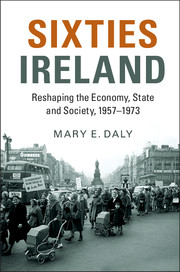Book contents
- Frontmatter
- Dedication
- Contents
- Acknowledgements
- List of abbreviations
- Introduction
- Part I The economy
- Part II Society
- 6 The optimism of a rising tide
- 7 Farewell to ‘the vanishing Irish’
- 8 Women, children and families
- 9 Second-wave feminism and the Irish family
- 10 The churches
- 11 Education, health and welfare
- Part III Politics and international relations
- Conclusion: abandoning the past?
- Bibliography
- Index
10 - The churches
from Part II - Society
Published online by Cambridge University Press: 05 March 2016
- Frontmatter
- Dedication
- Contents
- Acknowledgements
- List of abbreviations
- Introduction
- Part I The economy
- Part II Society
- 6 The optimism of a rising tide
- 7 Farewell to ‘the vanishing Irish’
- 8 Women, children and families
- 9 Second-wave feminism and the Irish family
- 10 The churches
- 11 Education, health and welfare
- Part III Politics and international relations
- Conclusion: abandoning the past?
- Bibliography
- Index
Summary
The emerging debate on contraception represented a direct challenge to the authority of the Catholic Church, though we should not overstate its extent – memoranda originating in the Department of Justice faithfully reflected Church statements on the dangers to society of liberalising access to contraception. But for a time during the 1960s, it appeared that the Church and the wider society would march arm in arm towards a modern and consensual future, marked by greater tolerance, less censoriousness and a shared commitment to social and economic progress. The Protestant churches were also changing, and there is evidence that the communities in the Republic and Northern Ireland were drifting apart, with the former identifying more strongly than before with the Irish state. Whatever divisions existed in the mid-1960s between Protestants in Ireland, north and south were seriously exacerbated after 1969 with the crisis in Northern Ireland. The 1960s also brought some erosion of deeply entrenched denominational divisions, with the emergence of more neutral social spaces such as commercial dance halls, the beginnings of more open recruitment in business and the professions, and measures to promote closer inter-church relations, which were encouraged by Pope John XXIII. But there were limits to this process. Some Protestants feared that their identity would be submerged; liberal voices within the Catholic Church faded. Yet, given the emotions aroused by violence in Northern Ireland, the lack of denominational tensions, and continuing commitment to inter-church meetings, however limited, should be applauded. And while the 1960s was a decade when greater affluence and individualism, the sexual revolution, second-wave feminism, political radicalisation and more liberal and even radical theologies combined to undermine the position of religion in Western society, the impact on Ireland was limited. Callum Brown, author of a comparative study of Ireland, Canada, Britain and the United States, concluded that ‘the sixties did not have the same resonance in Ireland’, as elsewhere. Although the numbers entering religion peaked in the mid-1960s and declined from that point, the Irish Catholic Church continued to have more than sufficient religious to meet its pastoral requirements. In 1971, 91 per cent of the population attended church every week. The Catholic Church continued to exercise a significant influence on politics and society. Nevertheless, in contrast to the past, the relationship/concordat between the church, the state and society was now contested and unstable, at continuing risk of challenge or revision.
- Type
- Chapter
- Information
- Sixties IrelandReshaping the Economy, State and Society, 1957–1973, pp. 191 - 213Publisher: Cambridge University PressPrint publication year: 2016



